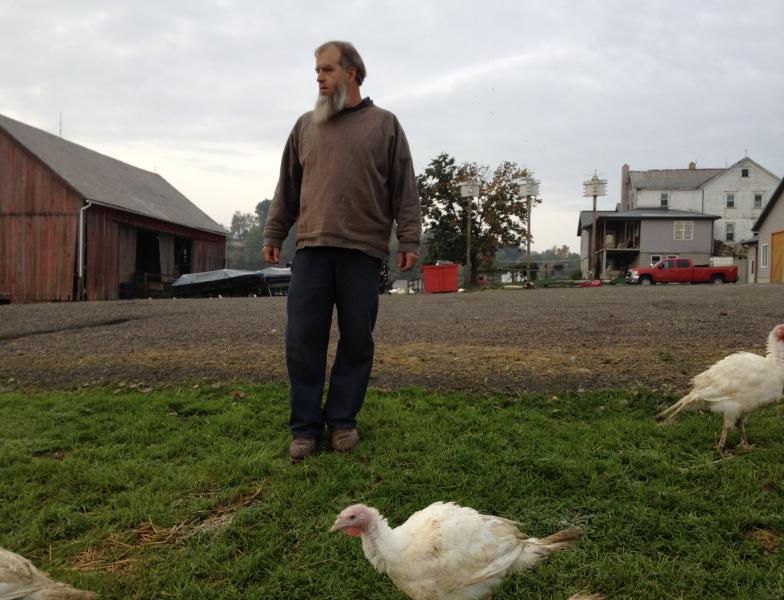Trevor Clatterbuck owns Fresh Fork Market, a Cleveland-based subscription service for local foods. Most of the turkey he’ll deliver to his customers for Thanksgiving is grown and processed in Amish country.

|
Photo by Vivian Goodman
Aidan Kein and Trevor Clatterbuck at Wholesome
Valley Farm in Wilmot. |
Clatterbuck has farmers raising his birds in several locations. After a tofu whey delivery at Wholesome Valley Farm in Wilmot he heads to Pleasant Valley Poultry in Baltic.
Freedom for the flock
Aden Troyer runs the poultry operation. He lets his birds roam free.
“They have a shed where they sleep in but they are free to roam around and eat grass, pebbles, and bugs , whatever, as nature intended to.”
Cladderbuck says that enhances the flavor .
“ You’re going to notice a world of a difference. You can see it in the meat. It’s almost a yellower tint to it, more of a golden, richer color.
Not wild or gamey
Troyer says it won’t taste gamey compared to supermarket turkey.
“They cook the same. They just have a richer flavor to them.”
He feeds his turkeys a non -GMO corn product, corn and soy product with organic vitamins and minerals.
 |
Photo by Vivian Goodman
Cladderbuck stopped at Wholesome Valley Farm in
Wilmot to deliver tofu whey for the turkeys and pigs
being grown for him there. |
Pecking for pebbles
But that’s not all they gobble down.
“They eat pebbles and that grinds their food in their gizzard. That pebble action. And we have found amazing things in turkey gizzards. Anything from washers to bolts to nails and anything shiny. We have found 20 gauge shot shells in these gizzards already. But then they use the pebbles and things that go in there is what actually grinds and creates a digestive part of it being that they can’t chew it.”
Serving small farmers
Pleasant Valley Poultry slaughters up to a thousand birds a day. Troyer operates one of only two processing operations in the state where small farmers can bring turkeys for slaughter. The other’s in Dayton. Fresh Fork’s Clatterbuck says he couldn’t provide his customers pasture-raised turkey without Troyer’s help. Clatterbuck’s Thanksgiving customer base has tripled in the three years he’s been in business.
Increased demand for farm-fresh , local food over the last few years also has Aden Troyer shopping for a bigger freezer.
Small farmers are allowed to slaughter only 1,000 birds a year on their own property. Troyer handles processing for 850 small farms.
 |
Photo by Vivian Goodman
Farm-raised turkeys are much bigger than wild
turkeys and do not fly. |
“There’s a lot of red tape and paperwork involved with this type of business. We are inspected by the Ohio Department of Agriculture. Every time we kill they inspect each individual bird for wholesomeness.”
A short life but a wholesome one
The turkeys live on the farms for approximately 4 months. Fresh Fork Market’s turkeys will be slaughtered the Monday before Thanksgiving, chilled but not frozen, then trucked up north the next morning. All the processing is done by hand.
“Each individual bird gets seen by 8 to 10 people, and if there is something that needs cut off or something that needs cleaned each person is able to do that. In a commercial operation it’s all done by machine.”
Troyer says free-range turkey tastes better than poultry raised in big commercial operations because the birds grow more slowly.
His biggest turkey ever was 60 pounds.
Feasting like pilgrims
Troyer says the optimal weight for a free-range turkey is from 16 to 22 pounds. Fresh Fork’s hens range from 15 to 18 pounds and cost $60. Toms at 20 pounds go for $65.
 |
Photo by Vivian Goodman
Farm-raised turkeys are much bigger than wild turkeys and do not fly. |
It’s more expensive than grocery story turkey but Clatterbuck’s customers feast like the pilgrims and are willing to pay for the experience.
“They understand the health of the bird in the pasture and when it comes to their table and they taste the flavor. They’re looking for that type of product.”
And that’s this week’s Quick Bite, but we’re not done talking turkey. Next week we visit with Chef Paul Minillo of Flour to learn how to brine a turkey. |